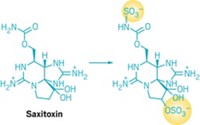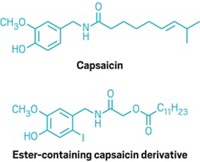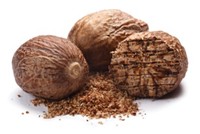Advertisement
Grab your lab coat. Let's get started
Welcome!
Welcome!
Create an account below to get 6 C&EN articles per month, receive newsletters and more - all free.
It seems this is your first time logging in online. Please enter the following information to continue.
As an ACS member you automatically get access to this site. All we need is few more details to create your reading experience.
Not you? Sign in with a different account.
Not you? Sign in with a different account.
ERROR 1
ERROR 1
ERROR 2
ERROR 2
ERROR 2
ERROR 2
ERROR 2
Password and Confirm password must match.
If you have an ACS member number, please enter it here so we can link this account to your membership. (optional)
ERROR 2
ACS values your privacy. By submitting your information, you are gaining access to C&EN and subscribing to our weekly newsletter. We use the information you provide to make your reading experience better, and we will never sell your data to third party members.
Medicinal Chemistry
Chili pepper compound made to self-destruct
To relieve itch and pain without worrisome side effects, chemists put a kill switch on capsaicin
by Deirdre Lockwood, special to C&EN
June 17, 2018
| A version of this story appeared in
Volume 96, Issue 25
Capsaicin, the compound that gives chili peppers their heat, soothes pain and itch by acting on an ion channel called TRPV1 in cells. But along with this relief, capsaicin and some of its derivatives can deliver troubling side effects, including a burning sensation and fever spikes. Now researchers have developed a modified capsaicin that skin enzymes inactivate within hours, averting some side effects while demonstrating pain and itch relief in mice (J. Med. Chem. 2018, DOI: 10.1021/acs.jmedchem.8b00109). Asia Fernández-Carvajal of Miguel Hernández University, Tracey Pirali of the University of Eastern Piedmont, and their colleagues made capsaicin derivatives (example shown) with a built-in self-destruct switch: an ester bond in the tail of the compounds. Esterase enzymes in skin hydrolyze this bond, producing two metabolites that the body easily eliminates. The researchers tested the compounds for activity on TRPV1 and then assayed the most potent candidates in human skin cells to find those that were significantly hydrolyzed. In mice, the best-performing molecule reduced sensitivity to heat, touch, and itch without producing body temperature spikes. The effects lasted up to 90 minutes.





Join the conversation
Contact the reporter
Submit a Letter to the Editor for publication
Engage with us on Twitter